French actor and director Charles Vanel (1892-1989) was a craggy-faced character actor with a rumbling voice and a piercing gaze. In a cinema career of 77 years, this ‘monument of the French cinema’ played in over 200 silent and sound films, in France and abroad. Vanel is best remembered as the silent driver in Le salaire de la peur/The Wages of Fear (Henri-Georges Clouzot, 1953), the retired chief commissioner in Les diaboliques/Diabolique (Henri-Georges Clouzot, 1955), and the policeman in To Catch a Thief (Alfred Hitchcock, 1955).
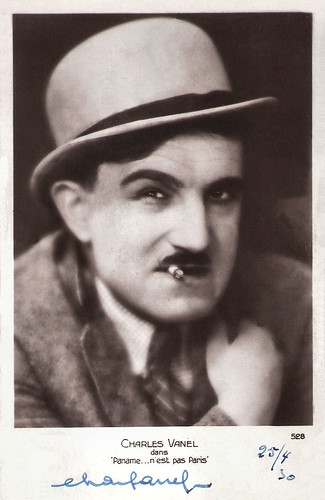
French postcard by Cinemagazine Edition, Paris, no. 528. Photo: publicity still for Paname... nést pas Paris/Apaches of Paris (Nikolai Malikoff, 1927). Signed by Vanel at 25 April 1930.

French postcard. Photo: Tobis / Les Productions J.N. Ermolieff. Publicity still of Charles Vanel as Ogareff in Michel Strogoff (Jacques de Baroncelli, 1936).
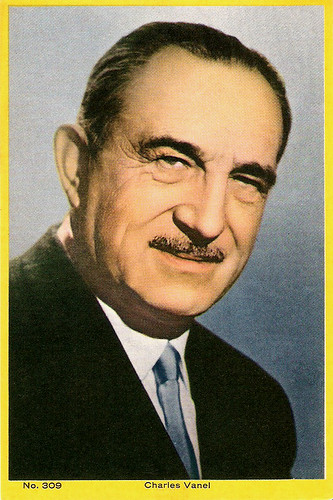
Mexican card.
Charles-Marie Vanel was born in Rennes, France, in 1892. His family moved to Paris in 1904, where his parents became shopkeepers. His adolescence was not very happy, being expelled by all the schools which he frequented. He tried to enlist in the Navy, but his poor sight put an end to this ambition.
Possessing a very fine voice, he decided to become an actor and in 1908, he made his stage debut in Hamlet at the age of 16. In 1912 followed his first film appearance in the short Western Jim Crow (Robert Péguy, 1912) opposite Joë Hamman. He participated in numerous theatre tours, in particular with Lucien Guitry during the war. Then he worked with Firmin Gémier at the Theatre Antoine before dedicating himself exclusively to the cinema.
His films of the 1910s included La p'tite du sixième/The Little Girl of the 6th (Louis Mercanton, René Hervil, 1917) and Miarka, la fille à l'ourse/Gypsy Passion (Louis Mercanton, 1920) with Réjane. He acted with the legendary Russian actor Ivan Mozzhukhin in L'Enfant du carnaval/The Child of the Carnival (Ivan Mozzhukhin, 1921), Tempêtes/Tempests (Robert Boudrioz, 1922), and La Maison du mystère/The House of Mystery (Alexandre Volkoff, 1923).
Vanel had his first success in Robert Boudrioz's drama about the grim life of French peasants, L'Atre/Tillers of the Soil (1922). This marked the beginning of a prolific silent film career. He appeared in many films by Jacques de Baroncelli, particularly in the Pierre Loti story Pêcheur d'Islande/Island Fishermen (1927), filmed in his native Brittany. He played in Germaine Dulac's melodrama Ame d'artiste/Heart of an Actress (1924) and René Clair's comedy drama Proie du vent/Prey of the Wind (1927) with Sandra Milowanoff. Vanel worked for German and Italian directors, and played Napoleon in Karl Grüne's Waterloo (1929).
Vanel directed Sandra Milowanoff in the feature film Dans la Nuit/In the Night (1929), in which he also played the leading role. This silent film was overlooked at the time because of the coming of sound, and it would stay the only feature film directed by Vanel. In 2002, at the request of filmmaker Bertrand Tavernier, Louis Sclavis composed and recorded a soundtrack for the film, and the Cinématheque Française restored Dans la Nuit. At Film Reference, Liam O’Leary writes: “which allows us to see a very talented director indeed. This story of rural love and jealousy set among quarry workers has a documentary realism”.
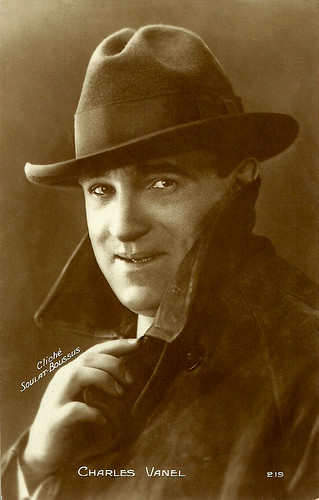
French postcard by Cinémagazine, no. 219 Photo: Soulat-Boussus.

French postcard by A.N., Paris, no. 182. Photo: G.L. Manuel Frères.
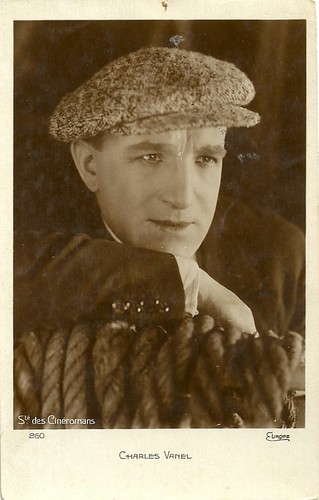
French postcard by Europe, no. 260. Photo: Société des Cinéromans.
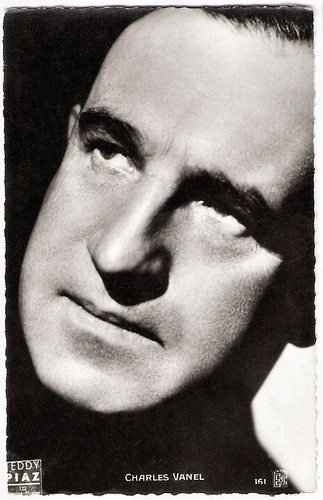
French postcard by Editions et Publications cinématographiques (EPC), no. 161. Photo: Teddy Piaz.
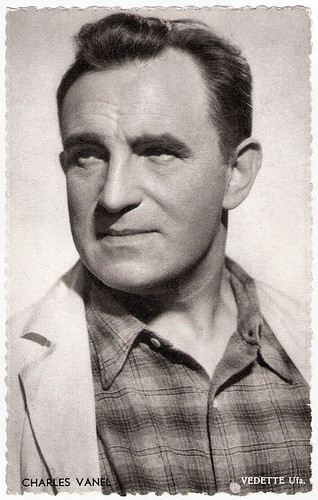
Belgian postcard by N. Els, Bromurite. Offered by Kwatta. Photo: Ufa.
With the arrival of sound, Charles Vanel spent two years in Germany on French versions of German films. On his return to France he became a familiar figure on the cinema screen. He played the nasty, relentless Inspector Javert opposite Harry Baur in the two-part screen version of Les Misérables (Raymond Bernard, 1934) and also appeared in Bernard’s prostitution and drugs drama Faubourg Montmarte (Raymond Bernard, 1931) and the powerful anti-war film Les Croix de bois/Wooden Crosses (Raymond Bernard, 1932).
He was in the Foreign Legion melodrama Le Grand Jeu/The Full Deck (Jacques Feyder, 1934), he played Jean Gabin’s buddy in the smash hit La Belle Equipe/The Good Crew (Julien Duvivier, 1936), and he appeared in Marcel Carné's first film as director, Jenny (1936), featuring Françoise Rosay. He also starred in Feyder’s La Loi du nord/Law of the North (Jacques Feyder, 1939) with Michèle Morgan.
His popularity diminished during the war years, but he was able to stage a comeback as a member of director Henri-Georges Clouzot's stock company. He played his most famous role as the eldest of four men assigned to drive two truckloads of nitroglycerine across dangerous terrain in Clouzot's agonisingly suspenseful Le Salaire de la peur/The Wages of Fear (Henri-Georges Clouzot, 1953). His increasingly frail character suffers humiliation at the hands of Yves Montand and endures remarkable physical torment during the dangers of the journey. For this role he received the Best Actor award at the Cannes Film Festival.
He reunited with Clouzot for Les Diaboliques/Diabolique (Henri-Georges Clouzot, 1955), and the courtroom drama La verité/The Truth (Henri-Georges Clouzot, 1958) starring Brigitte Bardot. At AllMovie, Jason Ankeny calls Les Diaboliques ‘The greatest film that Alfred Hitchcock never made: “A dark, dank thriller with a much-imitated ‘shock’ ending, Diabolique is a masterpiece of Grand Guignol suspense. The simple murder plot goes haywire, and Michel's corpse disappears, prompting strange rumors of his reappearance which grow more and more substantial as the film careens wildly towards its breathless conclusion.”
That same year Alfred Hitchcock cast Vanel as a policeman on the trail of cat burglar Cary Grant in To Catch a Thief (Alfred Hitchcock, 1955). It would be Vanel’s only Hollywood production. The following years he worked for other famous directors like Luis Buñuel in Le Mort en ce jardin/Death in the Garden (1956), Alberto Lattuada in La Steppa/The Steppe (1962), and Jean Pierre Melville in L'Ainé des Ferchaux/An Honorable Young Man (1962).
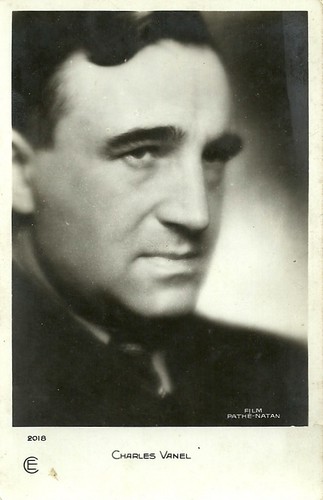
French postcard by CE, no. 2018. Photo: Film Pathé-Natan.
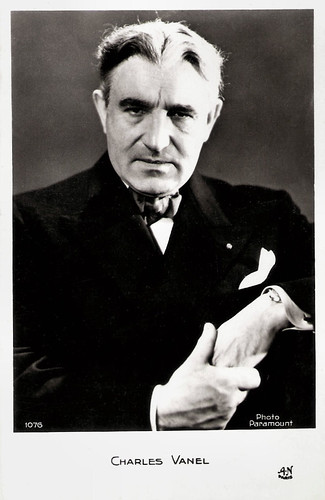
French postcard by A.N., Paris, no. 1076. Photo: Paramount.
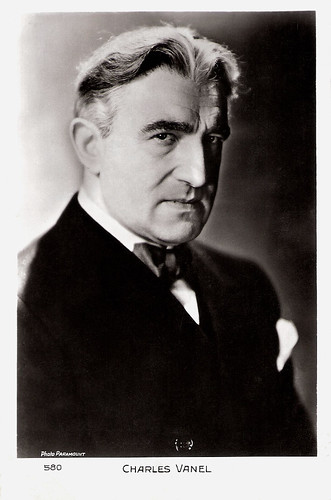
French postcard by Editions Chantal, Paris, no. 580. Photo: Paramount.
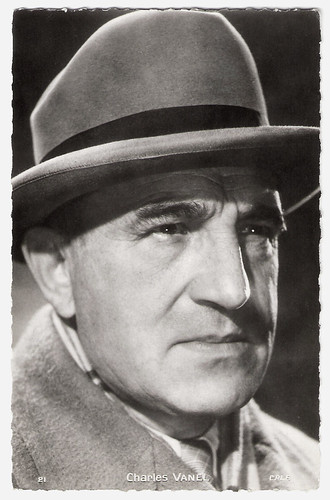
French postcard by Editions E.C., Paris, no. 21. Photo: C.P.L.E.
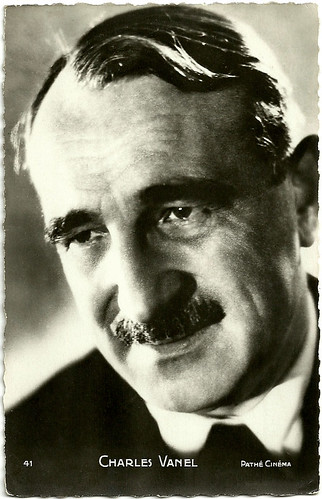
French postcard by Editions P.I., Paris, no. 41. Photo: Pathé Cinéma.
Charles Vanel was increasingly active on TV in the 1960s and 1970s, although he continued to appear in interesting films like the thriller Un homme de trop/Shock Troops (Costa Gravas, 1967).
At his site, author Jean Bernard-Luc analyses Vanel’s style: “Sobriety and the correct tone characterize Vanel’s acting. His monolithic appearance, his impassiveness is denied by his eyes, in which concentrates the intense life of his character. Most times, he played the dutiful man, whether he is a state employee, a serviceman, an adventurer or a gangster. He was almost never a seducer.”
In real life Vanel was married to Arlette Mauricette Bailly, and they lived in the south of France for the last 20 years of his life. As late as 1976 he played the leading role of the grandfather in the docudrama Es Herrscht Ruhe im Land/The Country Is Calm (Peter Lilienthal, 1976). That year he also appeared in the psychological drama Alice ou la Derniere Fugue/Alice or the Last Escapade (Claude Chabrol, 1976) starring Sylvia Kristel.
He played memorable parts in the Italian films Cadaveri eccellenti/The Excellent Corpses (Francesco Rosi, 1976) and Tre fratelli/Three Brothers (Francesco Rosi, 1981), an adaptation of a work by Andrei Platonov. The latter earned a Best Foreign Film Oscar nomination.
On 1978 Vanel was honoured with a special César award. He retired in 1982, only to make a wholly unexpected comeback at the age of 95 as an old prophet in Si le Soleil Ne Revenait Pas/If The Sun Never Returns (Claude Goretta, 1987). In Les Saisons Du Plaisir/The Seasons of Pleasure (Jean-Pierre Mocky, 1988) he played a 100-year-old perfume magnate who decides to marry. This would be his last film.
Charles Vanel died in 1989, in Cannes, France, at the age of 96. He had the longest career of any French film actor. However in Germany, actor Curt Bois even had an 80-year film career. In an interview with a Swiss newspaper in 1986, Vanel said: "You know, in our profession, there is no end. As long as one has the strength to do it, you can act."
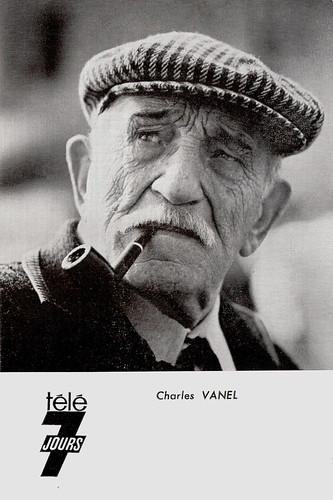
French postcard by Télé 7 Jours.
Scene from La Belle Equipe/The Good Crew (1936). Source: Herrmith (YouTube). Sorry, no subtitles.
Trailer for To catch a Thief (1955). Source: Video Detective (YouTube).
Sources: Liam O'Leary (Film Reference), Hal Erickson (AllMovie), Jason Ankeny (AllMovie), Jean Bernard-Luc (French), New York Times, TCM, Wikipedia and IMDb.

French postcard by Cinemagazine Edition, Paris, no. 528. Photo: publicity still for Paname... nést pas Paris/Apaches of Paris (Nikolai Malikoff, 1927). Signed by Vanel at 25 April 1930.

French postcard. Photo: Tobis / Les Productions J.N. Ermolieff. Publicity still of Charles Vanel as Ogareff in Michel Strogoff (Jacques de Baroncelli, 1936).

Mexican card.
A Prolific Silent Film Career
Charles-Marie Vanel was born in Rennes, France, in 1892. His family moved to Paris in 1904, where his parents became shopkeepers. His adolescence was not very happy, being expelled by all the schools which he frequented. He tried to enlist in the Navy, but his poor sight put an end to this ambition.
Possessing a very fine voice, he decided to become an actor and in 1908, he made his stage debut in Hamlet at the age of 16. In 1912 followed his first film appearance in the short Western Jim Crow (Robert Péguy, 1912) opposite Joë Hamman. He participated in numerous theatre tours, in particular with Lucien Guitry during the war. Then he worked with Firmin Gémier at the Theatre Antoine before dedicating himself exclusively to the cinema.
His films of the 1910s included La p'tite du sixième/The Little Girl of the 6th (Louis Mercanton, René Hervil, 1917) and Miarka, la fille à l'ourse/Gypsy Passion (Louis Mercanton, 1920) with Réjane. He acted with the legendary Russian actor Ivan Mozzhukhin in L'Enfant du carnaval/The Child of the Carnival (Ivan Mozzhukhin, 1921), Tempêtes/Tempests (Robert Boudrioz, 1922), and La Maison du mystère/The House of Mystery (Alexandre Volkoff, 1923).
Vanel had his first success in Robert Boudrioz's drama about the grim life of French peasants, L'Atre/Tillers of the Soil (1922). This marked the beginning of a prolific silent film career. He appeared in many films by Jacques de Baroncelli, particularly in the Pierre Loti story Pêcheur d'Islande/Island Fishermen (1927), filmed in his native Brittany. He played in Germaine Dulac's melodrama Ame d'artiste/Heart of an Actress (1924) and René Clair's comedy drama Proie du vent/Prey of the Wind (1927) with Sandra Milowanoff. Vanel worked for German and Italian directors, and played Napoleon in Karl Grüne's Waterloo (1929).
Vanel directed Sandra Milowanoff in the feature film Dans la Nuit/In the Night (1929), in which he also played the leading role. This silent film was overlooked at the time because of the coming of sound, and it would stay the only feature film directed by Vanel. In 2002, at the request of filmmaker Bertrand Tavernier, Louis Sclavis composed and recorded a soundtrack for the film, and the Cinématheque Française restored Dans la Nuit. At Film Reference, Liam O’Leary writes: “which allows us to see a very talented director indeed. This story of rural love and jealousy set among quarry workers has a documentary realism”.

French postcard by Cinémagazine, no. 219 Photo: Soulat-Boussus.

French postcard by A.N., Paris, no. 182. Photo: G.L. Manuel Frères.

French postcard by Europe, no. 260. Photo: Société des Cinéromans.

French postcard by Editions et Publications cinématographiques (EPC), no. 161. Photo: Teddy Piaz.

Belgian postcard by N. Els, Bromurite. Offered by Kwatta. Photo: Ufa.
Clouzot's Stock Company
With the arrival of sound, Charles Vanel spent two years in Germany on French versions of German films. On his return to France he became a familiar figure on the cinema screen. He played the nasty, relentless Inspector Javert opposite Harry Baur in the two-part screen version of Les Misérables (Raymond Bernard, 1934) and also appeared in Bernard’s prostitution and drugs drama Faubourg Montmarte (Raymond Bernard, 1931) and the powerful anti-war film Les Croix de bois/Wooden Crosses (Raymond Bernard, 1932).
He was in the Foreign Legion melodrama Le Grand Jeu/The Full Deck (Jacques Feyder, 1934), he played Jean Gabin’s buddy in the smash hit La Belle Equipe/The Good Crew (Julien Duvivier, 1936), and he appeared in Marcel Carné's first film as director, Jenny (1936), featuring Françoise Rosay. He also starred in Feyder’s La Loi du nord/Law of the North (Jacques Feyder, 1939) with Michèle Morgan.
His popularity diminished during the war years, but he was able to stage a comeback as a member of director Henri-Georges Clouzot's stock company. He played his most famous role as the eldest of four men assigned to drive two truckloads of nitroglycerine across dangerous terrain in Clouzot's agonisingly suspenseful Le Salaire de la peur/The Wages of Fear (Henri-Georges Clouzot, 1953). His increasingly frail character suffers humiliation at the hands of Yves Montand and endures remarkable physical torment during the dangers of the journey. For this role he received the Best Actor award at the Cannes Film Festival.
He reunited with Clouzot for Les Diaboliques/Diabolique (Henri-Georges Clouzot, 1955), and the courtroom drama La verité/The Truth (Henri-Georges Clouzot, 1958) starring Brigitte Bardot. At AllMovie, Jason Ankeny calls Les Diaboliques ‘The greatest film that Alfred Hitchcock never made: “A dark, dank thriller with a much-imitated ‘shock’ ending, Diabolique is a masterpiece of Grand Guignol suspense. The simple murder plot goes haywire, and Michel's corpse disappears, prompting strange rumors of his reappearance which grow more and more substantial as the film careens wildly towards its breathless conclusion.”
That same year Alfred Hitchcock cast Vanel as a policeman on the trail of cat burglar Cary Grant in To Catch a Thief (Alfred Hitchcock, 1955). It would be Vanel’s only Hollywood production. The following years he worked for other famous directors like Luis Buñuel in Le Mort en ce jardin/Death in the Garden (1956), Alberto Lattuada in La Steppa/The Steppe (1962), and Jean Pierre Melville in L'Ainé des Ferchaux/An Honorable Young Man (1962).

French postcard by CE, no. 2018. Photo: Film Pathé-Natan.

French postcard by A.N., Paris, no. 1076. Photo: Paramount.

French postcard by Editions Chantal, Paris, no. 580. Photo: Paramount.

French postcard by Editions E.C., Paris, no. 21. Photo: C.P.L.E.

French postcard by Editions P.I., Paris, no. 41. Photo: Pathé Cinéma.
Sobriety and the Correct Tone
Charles Vanel was increasingly active on TV in the 1960s and 1970s, although he continued to appear in interesting films like the thriller Un homme de trop/Shock Troops (Costa Gravas, 1967).
At his site, author Jean Bernard-Luc analyses Vanel’s style: “Sobriety and the correct tone characterize Vanel’s acting. His monolithic appearance, his impassiveness is denied by his eyes, in which concentrates the intense life of his character. Most times, he played the dutiful man, whether he is a state employee, a serviceman, an adventurer or a gangster. He was almost never a seducer.”
In real life Vanel was married to Arlette Mauricette Bailly, and they lived in the south of France for the last 20 years of his life. As late as 1976 he played the leading role of the grandfather in the docudrama Es Herrscht Ruhe im Land/The Country Is Calm (Peter Lilienthal, 1976). That year he also appeared in the psychological drama Alice ou la Derniere Fugue/Alice or the Last Escapade (Claude Chabrol, 1976) starring Sylvia Kristel.
He played memorable parts in the Italian films Cadaveri eccellenti/The Excellent Corpses (Francesco Rosi, 1976) and Tre fratelli/Three Brothers (Francesco Rosi, 1981), an adaptation of a work by Andrei Platonov. The latter earned a Best Foreign Film Oscar nomination.
On 1978 Vanel was honoured with a special César award. He retired in 1982, only to make a wholly unexpected comeback at the age of 95 as an old prophet in Si le Soleil Ne Revenait Pas/If The Sun Never Returns (Claude Goretta, 1987). In Les Saisons Du Plaisir/The Seasons of Pleasure (Jean-Pierre Mocky, 1988) he played a 100-year-old perfume magnate who decides to marry. This would be his last film.
Charles Vanel died in 1989, in Cannes, France, at the age of 96. He had the longest career of any French film actor. However in Germany, actor Curt Bois even had an 80-year film career. In an interview with a Swiss newspaper in 1986, Vanel said: "You know, in our profession, there is no end. As long as one has the strength to do it, you can act."

French postcard by Télé 7 Jours.
Scene from La Belle Equipe/The Good Crew (1936). Source: Herrmith (YouTube). Sorry, no subtitles.
Trailer for To catch a Thief (1955). Source: Video Detective (YouTube).
Sources: Liam O'Leary (Film Reference), Hal Erickson (AllMovie), Jason Ankeny (AllMovie), Jean Bernard-Luc (French), New York Times, TCM, Wikipedia and IMDb.
No comments:
Post a Comment